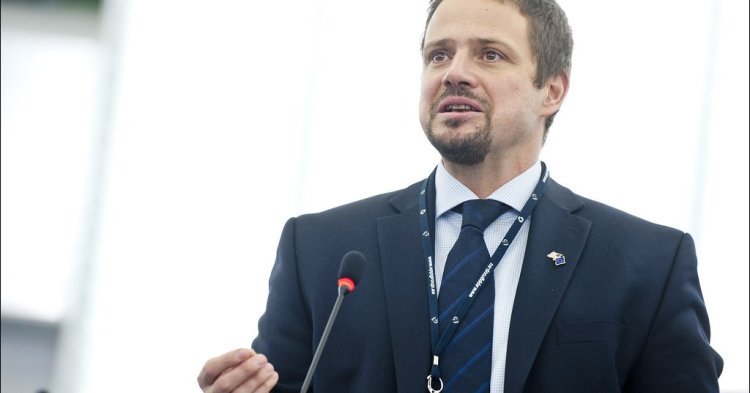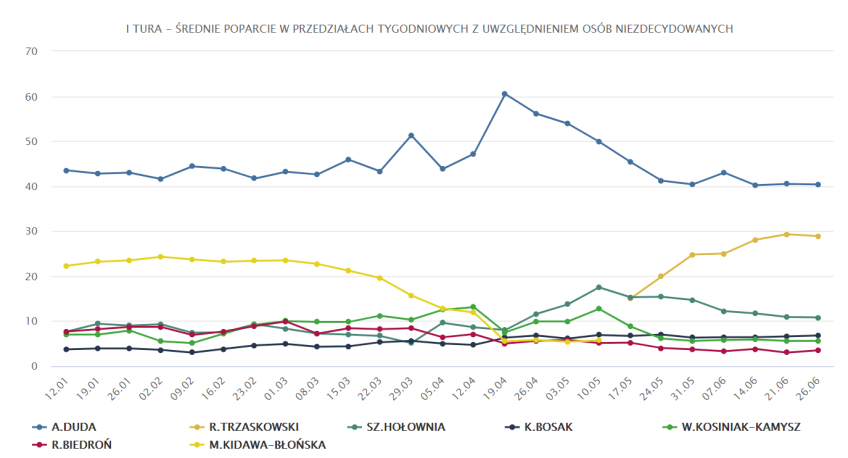Background
The significance of this vote must be clearly stated. Although Polish democracy is similar to French democracy, it would be more accurate to describe it as a mix between a parliamentary and a presidential system. In broader terms it means that the President’s powers are largely limited to vetos, nomination of judges, thus overseeing the government’s actions as a part of checks and balances. However, in the current situation even these limited abilities could significantly shake up the polish democracy if an opposition candidate wins. For example, the veto of a president can only be overturned by a 3/5th majority of the Sejm (the Polish parliament), which the current government does not possess.
Another important point to mention is that the Law and Justice party (198 seats in the Sejm) governs in coalition with two other right wing parties: the moderate Agreement (18 seats in the Sejm), and the radical United Poland (19 seats in the Sejm). This situation is markedly different from the 2015-2019 years, as now any of these parties can hold their big brother hostage since the governing coalition has only a 5 seat majority in the Sejm. As a result, even before the Covid-19 crisis there were significant tensions within the current government as both these coalition partners tried to shift the agenda in opposite directions.
First attempt
It is not novel that the polish government gets criticised for the erosion of its democratic institutions, but over the past few months the situation got only worse. The current Covid-19 crisis unleashed unforeseen pressures which resulted in postponing the elections from the 10th May to 28th June. This decision was a result of months of contention and debate.
It all started in late March when the government recognised that it is in its interest to hold the elections as soon as possible, in order to avoid the political consequences of a creeping economic crisis which is a direct result of the current pandemic. This did not sit well with the opposition parties, experts, and even with some members of the Agreement party, as all of them feared that such a move could seriously jeopardize public safety.
Controversy
The manner in which this first crisis was resolved was legally dubious, and as a result widely criticised. The government attempted to solve this situation by holding the election via mail-in-ballots, and proposed legislation on the 5th April which would allow this to happen.
However, because they fast tracked it, (the first three readings and debates were held on the same day) the bill was full of flaws and became widely criticised by national and international bodies like the OSCE. Later, the Supreme Court in a ruling from 27th April concluded that: “... due to the manner in which it was adopted by the Sejm and and to its numerous substantive flaws, [...] it should not be subject to further legislative work”.
Seeing that unleashed pressures had fractured the government, and that a final vote on this bill could be lost, an agreement had to be hammered out within the coalition. So on the 6th May Jaroslaw Kaczynski, head of Law and Justice, met with Jaroslaw Gowin, head of Agreement. The latter agreed on supporting this legislation, but only on the condition that the elections would be postponed anyway. Thus after a successful vote, a day later the President signed it into law.
Second date
On the 7th May the National Electoral Commission (NEC) announced that the elections would not be held on the 10th May, since according to the new legislation the NEC does not have authority over the printing of ballot papers. As such, it announced that all polls would be closed. On the 10th May the NEC ruled that the lack of votes for any candidate was legally equivalent to the lack of candidates, therefore, the Speaker of Sejm has to set a new date for elections.
Yes, I know it is confusing at best. But what is essential here, is that according to the new law, the elections must have been held on the 10th May. But as we have seen, the government couldn’t force that to happen. But it also ran out of time to cancel the elections. Consequently, they could only postpone it by playing silly legal interpretation games, which were legally dubious at best.
On 3rd June the Speaker of Sejm set the new date for the 28th June. But if you thought that there are no more legal problems you are seriously underestimating PiS. Article 128 of the Polish constitution clearly states that if a postponement of an election is needed, then the new date can only be set 14 days after the incumbent President leaves his office. This means that the elections could be held on the 6th August the earliest. Naturally, PiS argues that the elections have not been postponed, but rather they were never held, thus this article is not relevant. However, as seen before, due to the strange way it was achieved, namely by the use of the NEC, legality is not on the top of the agenda for this government.
There are two probable reasons why PiS does not want to postpone this election beyond the 28th June. First, they still fear the economic impact that Covid-19 will cause. Second, if the vote would be held after 6th August, it would mean that for two weeks or more, in the absence of the incumbent President, the Speaker of the Senate would take over his role. The only problem is that the Speaker of the Senate is from the opposition. All in all, the following elections are of questionable validity, which in a sense serves the current government well, since if an opposition candidate wins, his election will never be legally fully sound.
Candidates
But who could win such a race? And what do the current polls tell? Currently the main challenger is Rafał Trzaskowski. A new upcoming politician who served as the Mayor of Warsaw for the past year. He has a limited political record as the Minister for Administration and Digitisation between late 2013 and late 2014. Initially, this might seem to be a negative. But it has served him well so far, since he is not associated that closely with the failings of the Donald Tusk government. His approach has been more confrontational than other candidates, which was immediately visible during his first campaign speech, where he powerfully exclaimed: “We are going to fight for Poland”. Compared to other candidates, who might look for a sort of appeasement, he looks to be in favour of more drastic measures to restore the constitutional order.
The incumbent candidate is President Andrzej Duda. He has been widely criticised by the opposition as a “President-notary” who signs everything the Sejm passes. Although, this is not fully true, since there were some disagreements between the government and the President mainly on the most controversial bills which resulted in protests. However, in general his ability to influence policy is very limited, and this is clear to most Poles.
Who will win?
Recent polls show that the first round of elections will be won by Andrzej Duda, but since he is not likely to get a 50% majority, it means that all will be decided in the second round on the 12th July. Here the polls are unclear, but so far there is a visible rise in the competitiveness of Rafał Trzaskowski as seen below.
What is abundantly clear from the last election, where the incumbent lost rather surprisingly, is that the situation is still too dynamic to properly hedge our bets. However, if we follow the example of that election, we should not underestimate the importance of televised debates or lack thereof. Even now, the visible rise of Trzaskowski after the 17th March is probably closely tied to a debate that was held on TVP that day. As it currently stands, the outcome of this election could be a watershed moment for polish democracy, or a continuation of current illiberal trends.



Follow the comments: |
|
